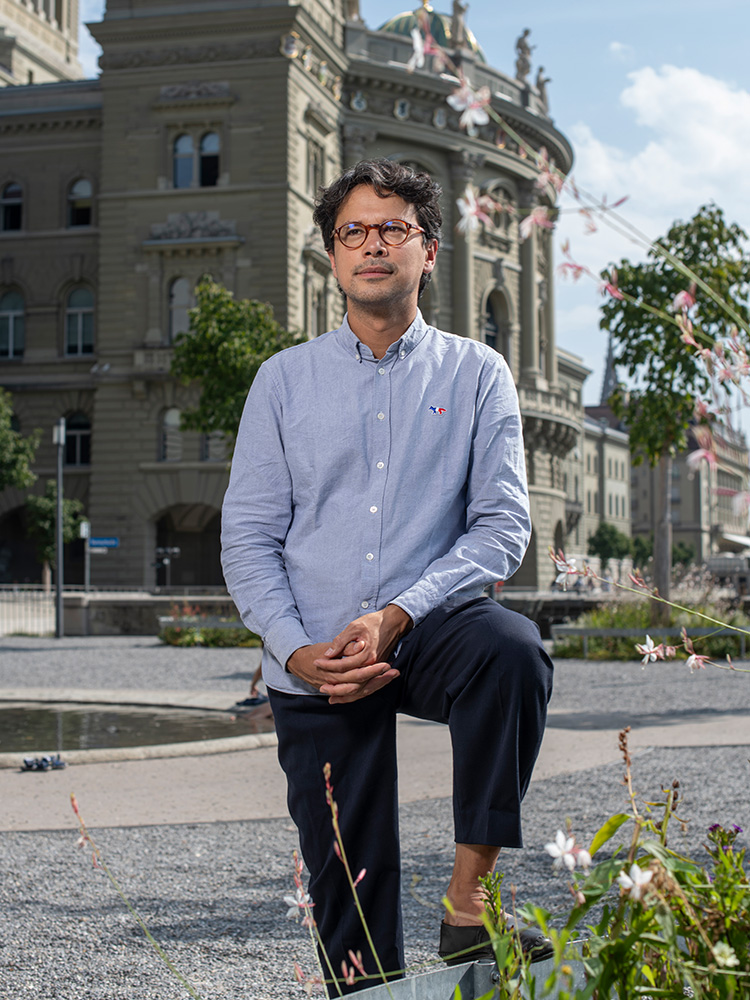Hooked on politics.
Text: Marion Maurer
In his youth, An Lac Truong Dinh memorized the names of Switzerland’s parliament members. Today, the Basel alumnus works as a political advisor to Swiss Federal Council member Elisabeth Baume-Schneider.
As an advisor on cultural, foreign and security policy, An Lac Truong Dinh is part of the team of advisors supporting the head of the Federal Department of Home Affairs (FDHA). How does a person end up in a job like this? What qualities do you need?
Truong Dinh emphasizes one thing in particular: “Enthusiasm for the political system and its institutions. Switzerland’s political processes can be very drawn out, so you have to be really passionate.”
Truong Dinh first discovered his passion for politics during the 1992 national referendum on the European Economic Area and the turbulent election of Ruth Dreifuss to the Swiss Federal Council. Eleven years old at the time, Truong Dinh started watching “Arena” (a political discussion show on the TV channel SRF), studied the party system and learned the names of every politician. “I think I knew them better then than I do today,” he says with a laugh. But above all else, he aspired to make change happen and to advocate for social justice, particularly in the areas of migration and international cooperation.
Education as integration.
Truong Dinh was born in France, spent a few years in the USA and then grew up in Möhlin in the greater Basel area. His mother is Spanish, his father a war refugee from Vietnam. “My father had to emigrate several times. For him, and for us as a family, education has always played a central role – it’s important for integration,” says Truong Dinh. “I had a sheltered upbringing, but my father’s experiences influenced me, too.”
Aiming to work in the field of development cooperation, he studied history and sociology in Basel with a focus on migration, international cooperation and Asia. For his “Lizentiat” thesis, he set out on the trail of Emil Selhofer, a Swiss sailor who joined the Viet Minh freedom movement in 1944. For his efforts, Truong Dinh was awarded the 2012 Prix Média for excellence in science journalism by the Swiss Academies of Arts and Sciences.
Academic work opens doors.
“The award might have helped me to open some doors,” he speculates. It’s difficult to gauge the significance of his subsequent doctorate – which he also earned in Basel – for his career. “It was definitely a valuable experience for me, and I couldn’t have done it on this scale anywhere else. I was able to spend years delving into the development collaboration between Vietnam, Switzerland and Bhutan. It was important to me to allow my studies to be guided by my interests without losing sight of my career prospects.”
Following his doctorate, Truong Dinh was given the opportunity – with financial support from the Foundation Political Scholarships – to observe the Swiss parliament’s political processes up close, including the Commission meetings that take place behind closed doors.
He later switched perspective and was responsible for responding to parliamentary requests at the State Secretariat for Education, Research and Innovation. “The fact that I am both familiar with the parliamentary viewpoint and have served on the staff of a Federal office was definitely a crucial advantage when I applied to be an advisor at the FDHA.”
Academia as a basis for making decisions.
In this role, Truong Dinh manages the Federal Office of Culture, the Swiss cultural foundation Pro Helvetia, and the Swiss National Museum in Zürich. He accompanies the head of the department to parliamentary and Commission meetings and to cultural events. He prepares information and arguments for her, and reviews reports and parliamentary speeches.
Truong Dinh is also responsible for advising the Interior Minister on the dealings of the Federal Department of Foreign Affairs and the Federal Department of Defence, Civil Protection and Sport. “I often have to get to grips with highly complex matters in very little time and draw a political conclusion from a large amount of information.
But when you study history, you learn very well how to approach sources with a critical eye, particularly a large number of sources.” He emphasizes something else as well: “In my view, academia has to provide politics with the foundations for making fact-based decisions. This is why it’s important for politics that academia is free and independent.”
More articles in this issue of UNI NOVA (November 2024).

